'Nature farming cut leaves black hole in our finances'
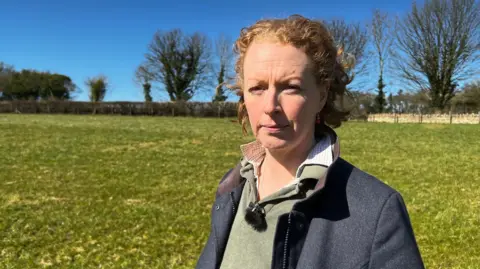 BBC
BBCThere is growing anger among farmers who have missed out on thousands of pounds after the government stopped payments for environmental work.
One Wiltshire dairy farmer said she now faces a "massive black hole" in her finances after the Sustainable Farming Incentive (SFI) scheme was closed unexpectedly.
The National Farmers' Union said "thousands of farmers" had lost out.
The farming minister insisted the scheme was "now fully subscribed" and would be "reformed".
Sarah Godwin and her family farm several hundred acres of Cotswold pasture, west of Chippenham. Like many, she had been working on improving the fields to boost biodiversity and help insects and bees thrive.
"If we were going all out for cash," she explained, "We'd just plant one type of high-yield grass."
To a townie like me, her fields all just look like grass. But not all grass is the same.
Plant a high-yield grass variety, with fertilisers and sprays, and your cows will produce more milk. But insects, pollinators and birds will suffer.
Instead, the Godwins were planning to plant a wide variety of herbs, wildflowers and grasses, called 'herbal leys'. These are less commercially profitable, as the cows will make less milk.
"But they are better for soil health, better for pollinators, better for the environment," Sarah explained.
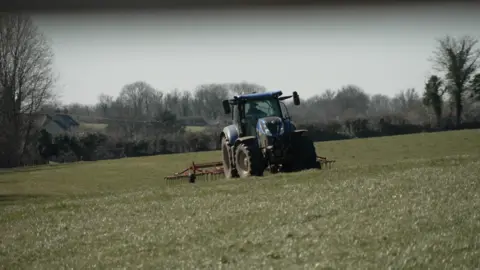
To encourage farmers to plant fields like this, the government's SFI scheme paid compensation, at £382 per hectare.
The Godwins had nearly finished the lengthy application process.
"We'd spent months putting the application together, we'd paid over £1,000 in agent's fees, we were just doing the final checks," she said.
"Then the government shut the applications down, without any warning."
Losing the SFI grants will cost them a lot of money.
"For us it is tens of thousands of pounds of lost income. We now have a massive black hole in our budget for this year," added Mrs Godwin.
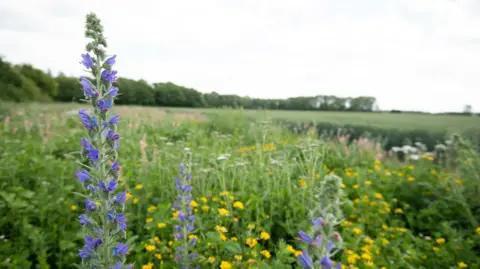 RSPB
RSPBAre the Godwins alone?
No, says Tom Collins, another Wiltshire farmer, and county chair of the National Farmers' Union.
"There were thousands of farmers who wanted to join the scheme and support nature," he told me.
Like many, he too had changed his farm to improve biodiversity. He showed me a field ploughed and planted up for wheat, but with a six-metre strip left wild round the edge, up to an old Cotswold stone wall.
"This is great for birds and bugs," he said. "The sprays for the wheat don't touch this strip, it's 300 metres long."
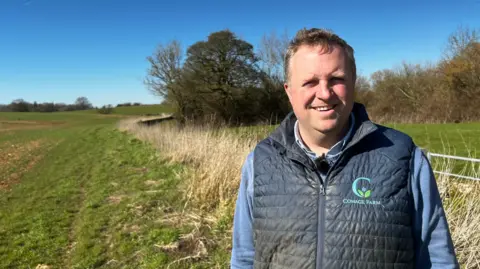
Obviously he will lose money on the land where wheat is not growing, so Mr Collins had also applied for the SFI funding. He had managed to get his application in earlier, and was successful. There was no published deadline, just a rolling process.
He said there were "thousands of farmers" who wanted to join the scheme, but then, without warning, it was closed to new applications.
"It's a huge shock to the industry. The SFI is a huge lifeline for a lot of businesses. Doing that nature work on their farm, guaranteed to be paid for that work is a huge cashflow benefit."
So what is the government's rationale for this sudden closure to an environmental support scheme?
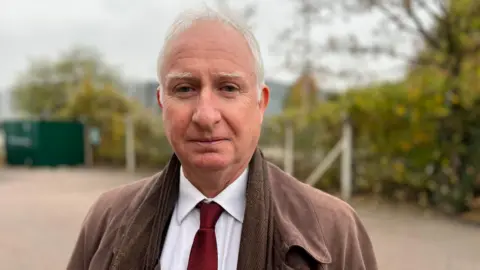
The government insists that the SFI scheme has been such a success it has simply used up its budget.
Minister for Food Security and Rural Affairs Daniel Zeichner said: "More farmers are now in schemes and more money is being spent through them than ever before."
It's understood that a new "reformed" scheme will be introduced in 2026, with applications opening in the summer of 2025.
Mr Zeichner said the revised scheme would "align" with the government's land use framework and contribute to the priorities of food, farming and nature.
But meantime, the NFU says thousands of farmers will have no choice but to plough up the land they had set aside for nature.
Tom Collins said: "These farmers are going to have to go for it, they're going to have to farm all these areas, and maximise their farming output, because they can't do the environmental work.
"Nature will be the loser, as well as the farmers."
Follow BBC Wiltshire on Facebook, X and Instagram. Send your story ideas to us on email or via WhatsApp on 0800 313 4630.
